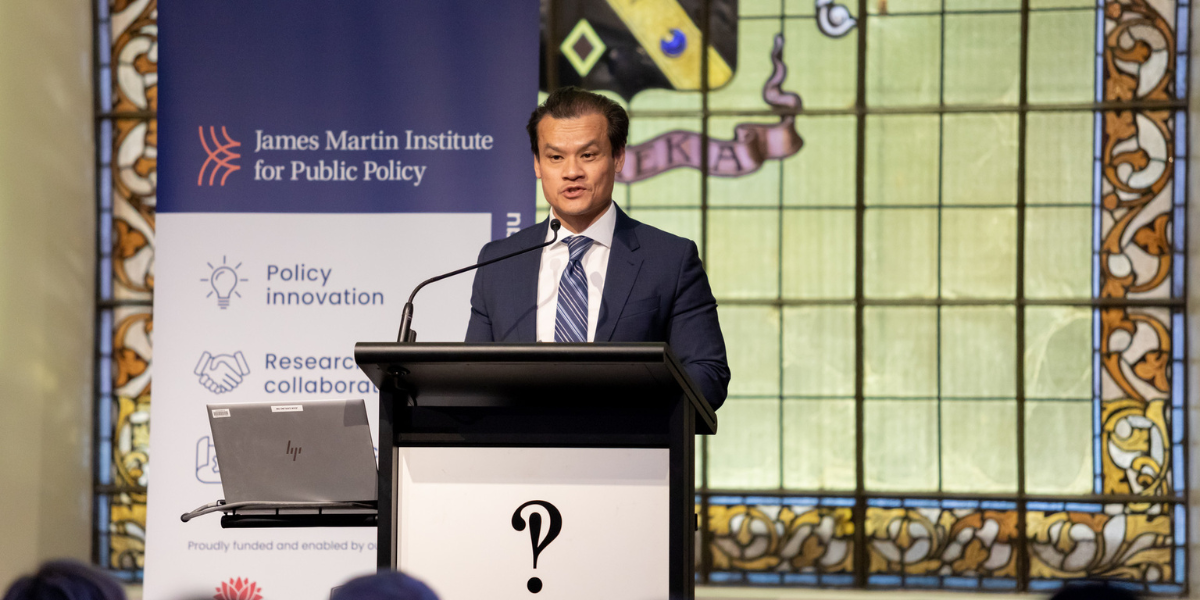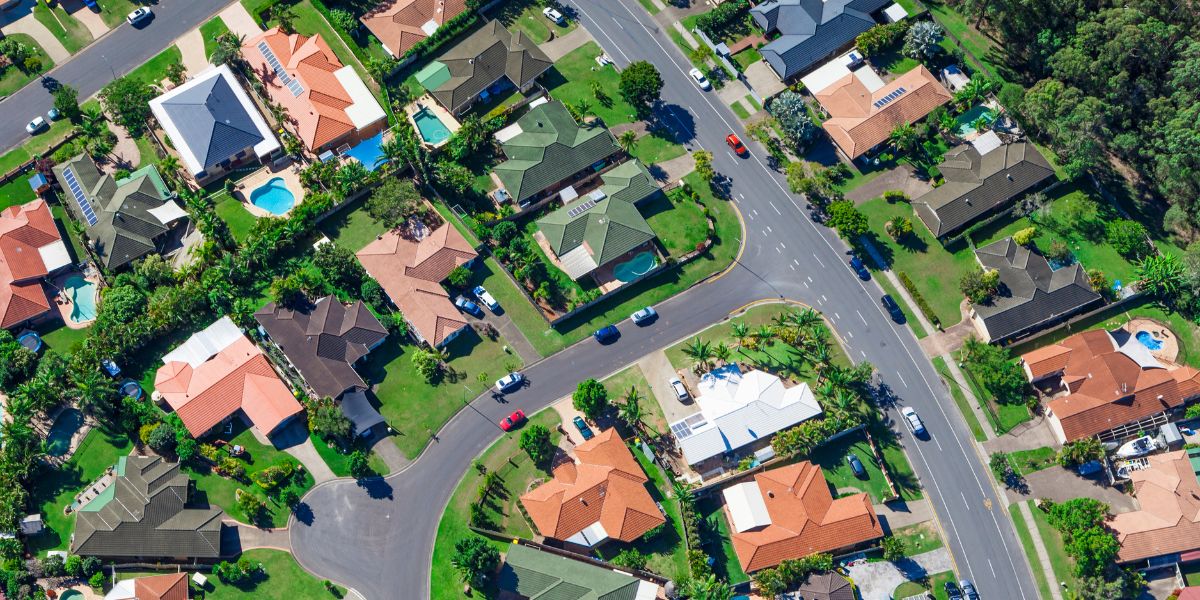12 December 2023
To the chair, Peter Shergold AC, Libby Hackett, CEO, members of the Institute, and of course colleagues and friends – can I first of all say thanks to Uncle Alan Murray for his warm welcome to the lands of his ancestors. It’s indeed important that all of us work towards closing the gap for our Indigenous Australians.
Whilst many of us will be disappointed with the outcome of the Voice referendum, I am encouraged that not one Australian that I have since spoken to is not committed to closing the gap.
It would weigh heavily on the heart of all Australians to know that a section of our community is overrepresented in some of the more negative categories and underrepresented in some of the more positive categories in our society. Nevertheless, closing the gap is indeed a national project, which all of us are deeply committed to.
Can I also personally thank the James Martin Institute for inviting me to speak tonight. I congratulate you on hosting this very prestigious event for the second year. I would also like to congratulate the seven recipients of the 2023 Policy Challenge Grants.
In thinking about the awards tonight, I am reminded of my great political hero the late Gough Whitlam, the former Prime Minister of Australia. He always said that the purpose of education policy, or policy in general, was not just to get an answer, but to actually raise our community’s expectation of what we can be, what we should be, and what we must be. This is the overall goal that all of us must try to achieve.
Importance of sound policy development
In government, it is vital to make informed decisions based on sound evidence, robust policy development, thorough consultation, and innovative thinking and approaches. I’d like to acknowledge the Institute’s interest in encouraging sound policy approaches, including through these grant awards.
As an economist, I can strongly vouch for evidence-based decision-making. It is the approach that I have applied to all my professional decisions and it’s the same approach that I apply in my parliamentary duties.
As an economist, I will say that Australia on a per capita basis is one of the richest, wealthiest, most advanced, and healthiest countries with one of the highest living standards anywhere in the world. Our income is high, our social safety net system is sound, and our material wealth is solid.
But colleagues, I would argue that what defines us as a nation and what distinguishes us as a people is not monetary value or material wealth. Rather, it is the tone of our political debate, the depth of our public discourse, and the role of science, statistics, reasoning, and rationale in our civil society. How we disagree and how we debate our differences is the real measure of us all.
The most valuable “wealth transfer” to the next and future generations of Australians is not the property portfolio nor the inherited indexed funds. Rather, it is the transfer of knowledge and the communal value we place on education and our educational institutional framework.
We want to give our people more than an education degree. We want to give them a decision-making framework that will help to build a better community: asking the right questions and developing the right methods to find the answers; empowering the next generation to pursue a noble cause in intellectual curiosity; continuing the knowledge foundation; and the never-ending pursuit for answers to the new challenges of our time.
It is very much about planting the knowledge tree – even when one may never get to sit in the shade.
That’s why the James Martin Institute, and all of our educational institutions, play such an important role in building this community benefit. It is even more important in the age of technology and artificial intelligence that we pass on to our children the skills, knowledge and ability to decide to apply their own analytical decision-making framework: to know what’s true and what might need to be questioned.
Where information flows instantaneously – and with the influence of false information – it has never been more important for people to be able to decide for themselves what might be a truth and what the purpose might be for which this information is being relied on, because no institution, no government, is going to be able to do this on its own. We must empower our people with the gift of being able to think for themselves.
Resources to tackle policy challenges
As everyone in this room is acutely aware, we are facing more difficult policy challenges as the world becomes more complex, as climate change increasingly affects us, and as new technology like AI become embedded in our lives – for better or for worse.
To meet these complex challenges we must harness all the resources, skills, innovation, and diversity of approaches and disciplines that are available to us.
In NSW, we are fortunate to have skilled policy practitioners working in our departments and agencies. As an economist, I will always vouch for the value-add of human capital, which greatly outweighs the financial capital or anything that we might invest in and anything we might actually develop. And in NSW, we are extremely fortunate to have world class universities with skilled, creative researchers providing us a deep well of research, policy expertise, innovative approaches, and new thinking. Along with the policy teams in NSW government agencies and departments, our universities and policy institutes are an essential part of our state’s – and indeed the nation’s – public policy infrastructure.
As many of you in the audience know, our universities are critical drivers of research and development, innovation, and new industries. Universities foster the research and knowledge ecosystems that inform evidence-based, transformative public policy and decision-making. And they educate our public servants – amongst the world’s best. The cultural influence of our universities and all of our educational institutions is really what makes us a civil society that is amongst the world’s best.
We are also fortunate in NSW to have the James Martin Institute for Public Policy as our independent driver of research-informed policymaking – working to build relationships and forging clear pathways for academic and policymaker collaboration. As a partner to government and to our state’s universities, the Institute’s mission is to bring expert advice into policymaking to help solve our most complex challenges.
The Institute harnesses the deep and diverse expertise available in our universities and helps translates that into practical policy options. It’s been just over two years since the Institute opened its doors and its achievements in pathbreaking research projects, grants, and collaborations are indeed extremely impressive. The Institute has already demonstrated its ability to generate transformative new ideas and offer pathways forward on some of our most important policy problems.
The Institute’s Policy Challenge Grants, which support teams to take on timely and critically important issues for the state and the nation, advance the Institute’s mission. This work, exemplified in the Policy Challenge Grants, provides a valuable tool for the government, uplifting public sector capacity and bringing world-leading research expertise into different areas of public policy.
I for one, am looking forward to seeing how the great ideas generated through these Grants will be translated into policy recommendations to government.
Industry policy
I’d like to take this opportunity tonight to talk about our new industry policy. This will set a forward-looking agenda: a framework and a consistent approach to the use of industry policy levers and collaboration across government and with the private sector.
Like the mathematical nerd that I am, I have to say that for me industry policy crystallises into a very simple multiplication. It is really a four-by-four by five approach! It is four missions reviewed every four years, with five focus sectors, and two enablers. It is about increasing productivity and economic resilience, securing the opportunities from the energy transition and sustainability, and attracting and retaining human capital. We will focus on five sectors – we’re looking at sectors like life sciences, agritech and food, defence and aerospace, energy and critical minerals – with the enablers being technology and innovation and of course, manufacturing.
These have been chosen based on evidence and on the mathematical approach of thinking where the biggest margin of growth that we can actually attain is and what comparative advantages we currently have, to make a real difference to all people both in NSW and globally. Adopting high-level goals will provide confidence that government programs and activities across skills, trade and innovation and other relevant areas will improve living standards in NSW and with our trading partners.
It is more important than ever to have a stable and transparent policy approach to guide the investments we need to diversify and grow NSW industries. This approach, I believe, is coherent, and collaborative and will intensify the international competitiveness of our industries and our economy. We are emphasising innovation and skills as critical pathways to revive productivity, along with the role of trade and investment for economic growth and resilience. We need to move away, I believe, from the traditional focus on government interventions and instead focus on the “interactions” between government, industry and the university sector and our public policy think tanks.
In other words, I want to emphasise collaboration and partnership between our sectors, which will create a more holistic approach and help better understand the repercussions of the decisions we make.
Finally, as part of developing and implementing industry policy, I want to ensure that we share the benefits that will accrue right across NSW, in particular in our regions. One can reasonably argue that, for example, some economic drivers over the last decades have been highly urbanised, like in the service sector. This has seen wealth concentration embedded in our more concentrated urban areas – which of course means that a lot of our regional areas are struggling to find a place in the economic world. This has significant social and political repercussions. Spatial and geographic equity is the core business of governing, and we should use our industry and economic policies to ensure we spread the wealth to all people right across our state.
Decarbonisation
While decisions have still to be made, energy transition is clearly a focus of the NSW Government.
The global pursuit of decarbonisation will open significant new domestic and export opportunities for NSW businesses and foster new value-adding industries. In NSW, we have substantial resources that are vital to the development of renewable technologies – critical minerals, abundant sunlight and wind, advanced research capabilities and a skilled workforce. However, achieving the energy transition will require significant capital expenditure over the next 40 years. Private sector action is critical, but we will also need to work with all the levers available to government to ensure we can reach net zero by 2050.
NSW will need to send clear signals to investors and industry and develop a strong business environment to attract the investment capital required. We can do better – and we must do better – than just digging things up and shipping them off overseas. We need to empower our research institutions, our innovative sectors, and our trade industries, to ensure we can get the most out of our natural resources.
Innovation
An important part of us realising these ambitions will be around our approach to nurturing innovation in NSW because innovation is the driving force for social and economic wellbeing, industry growth and productivity for the people of NSW. For innovation to flourish, Government initiatives need to not only encourage innovation and innovative environments, but also value the innovation which is already taking place.
Fostering local and foreign investment in innovative technologies will help transition and diversify our economy and build new local industries. Like the industry policy, I’ve also tried to crystallise this in a very simple mathematical number.
It’s actually what I call the ‘Four I’s’. The development of the NSW Innovation Blueprint, announced in September, will be centred around the Four I’s: Ideas, Investment, Industrialisation, and Internationalism.
Together with our new industry policy, the Blueprint must encourage NSW businesses to adopt advances and technologies generated by our world-leading universities and research institutes and innovation intensive ventures – the intellectual property and new technologies that will lift productivity, economic resilience, and sustainable practices. This will be about creating ideas for the global market. It will require investment, inventiveness and the industrial capacity of NSW: our people, our fiscal capital and our human capital.
Equity is again an important part of our consideration – not just for regional areas, but for women as well. In Australia for example, only 22 per cent of start-ups are founded by women, and solo women founders receive less than 3 per cent of venture capital. And yet, on average, women-led start-ups perform better than start-ups led by men, they generate on average 10 per cent more in cumulative revenue and over twice the return. We need the ideas and talent of our entire population to maximise our economic development and social prosperity. Female led start-ups are part of the engine through which we can achieve this.
There is no shortage of reports and metrics that show NSW – and Australia as a whole – don’t rank well in comparison to some of our peers in terms of converting innovation inputs into tangible benefits for people and the economy. The recently released 2023 edition of the Global Innovation Index places Australia 24th overall in innovation. By comparison, Singapore is ranked fifth and the Republic of Korea is ranked tenth. Digging a bit deeper, our innovation inputs, which include tertiary education and R&D, are ranked 16th, whereas our innovation outputs, which include knowledge impact and diffusion, are ranked 30th. What does it say about some of our institutional components when there is such difference between us and our advanced trading partners? This can and must change.
Despite all this, I am particularly interested in how governments can promote more interaction between different parts of the innovation ecosystem to overcome knowledge barriers and drive collaboration. I believe that we have the people, institutions and competitive edge to close that gap. What is missing perhaps is better drive and better collaboration between the sectors to close this gap. Place-based approaches such as innovation districts are one way to achieve this. Research networks such as the NSW Smart Sensing Network are another.
As part of developing the Blueprint, I invite everybody here to get involved and engage with the Department as we develop the Innovation Blueprint, including the Innovation Blueprint Ideas Summit taking place early next year. We acknowledge the wealth of information our stakeholders have provided during previous consultations, and this Summit will focus on building on the big ideas and recommendations to set the best conditions for innovation and investment in NSW.
To conclude, I’ll leave you with this: governments should not be afraid of expert advice – in fact we should and do welcome it. We can only be better if we allow differences and debates to occur and use our differences to work towards a stronger solution. Equally, researchers should not see government and policymaking as a remote or elite domain, closed off to academic input. The best policymaking mixes the science of the probable – research – with the art of the possible – policy and politics.
To make progress, we need to foster knowledge infrastructure and ecosystems to connect the NSW Government with the private sector and research institutions and policy think tanks, harnessing expertise and knowledge from all quarters to tackle the policy challenges we all face.
The work of the James Martin Institute is an important part of this knowledge ecosystem, uplifting public sector capacity and bringing world-leading research expertise into policy proposals and solutions.
I congratulate the Institute for initiating these grants, and I congratulate this year’s Policy Challenge Grant Winners. I feel very privileged to be able to give the keynote speech this year.
Thank you very much.
The Hon Anoulack Chanthivong MP is the NSW Minister for Better Regulation and Fair Trading, Minister for Industry and Trade, Minister for Innovation, Science and Technology, Minister for Building, and Minister for Corrections. He has served in NSW Parliament since 2015 as the Member for Macquarie Fields.
This keynote speech was delivered by Minister Chanthivong at the State Library of NSW on 22 November 2023, at an awards reception for the 2023 JMI Policy Challenge Grant.
Image credit: Chad Ajamian, Getty Images
Features
Simon Rowell
Teddy Nagaddya, Jenna Condie, Sharlotte Tusasiirwe & Kate Huppatz
Subscribe to The Policymaker
Explore more articles
Teddy Nagaddya, Jenna Condie, Sharlotte Tusasiirwe & Kate Huppatz
Ehsan Noroozinejad Farsangi & Hassan Gholipour Fereidouni
Features
Simon Rowell
Teddy Nagaddya, Jenna Condie, Sharlotte Tusasiirwe & Kate Huppatz
Explore more articles
Teddy Nagaddya, Jenna Condie, Sharlotte Tusasiirwe & Kate Huppatz
Ehsan Noroozinejad Farsangi & Hassan Gholipour Fereidouni
Subscribe to The Policymaker








